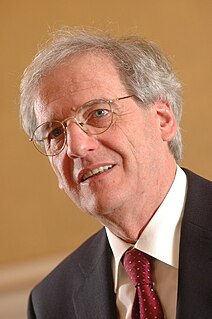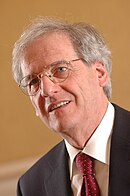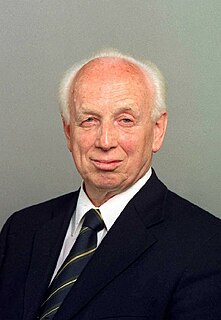
Ferenc Mádl was a Hungarian legal scholar, professor and politician, who served as the second President of the third Republic of Hungary, between 4 August 2000 and 5 August 2005. Prior to that he had been minister without portfolio between 1990 and 1993 then Minister of Education between 1993 and 1994 in the conservative cabinets of József Antall and Péter Boross. Mádl ran unsuccessfully for the position of President of Hungary in 1995, defeated by Árpád Göncz. Five years later he was elected President as the candidate of the governing conservative coalition.

The President of the Republic of Hungary is the head of state of Hungary. The office has a largely ceremonial (figurehead) role, but may also veto legislation or send legislation to the Constitutional Court for review. Most other executive powers, such as selecting Government ministers and leading legislative initiatives, are vested in the office of the Prime Minister instead.
The Constitutional Court of Hungary is a special court of Hungary, making judicial review of the acts of the Parliament of Hungary. The official seat of the Constitutional Court is Budapest. Until 2012 the seat was Esztergom.
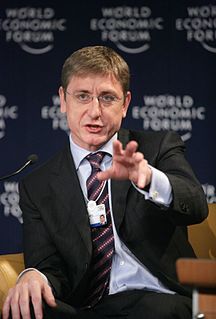
Ferenc Gyurcsány is a Hungarian entrepreneur and politician. He was Prime Minister of Hungary from 2004 to 2009. Prior to that, he served as Minister of Youth Affairs and Sports between 2003 and 2004.

Gyula Horn was a Hungarian politician who served as the third Prime Minister of the Republic of Hungary from 1994 to 1998.

Pál Schmitt is a Hungarian Olympic fencer and politician who served as President of Hungary from 2010 to 2012.

Katalin Szili is a former member of the Hungarian Parliament, who served as the Speaker of the National Assembly of Hungary from 2002 to 2009.
Tibor Simon was a Hungarian football player and manager.
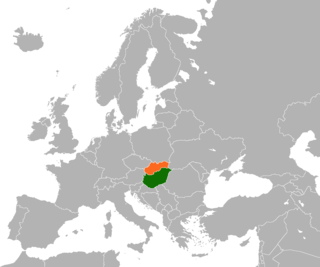
Hungary and Slovakia are two neighboring countries in Central Europe. There are two major periods of official foreign relations between them in contemporary history. The first period included relations between the Kingdom of Hungary and the first Slovak Republic in 1939-1945. The second period has started in 1993, when the countries again established diplomatic relations, the year when Slovakia became independent of Czechoslovakia. Hungary has an embassy in Bratislava and a general consulate in Košice , and Slovakia has an embassy in Budapest and a general consulate in Békéscsaba.
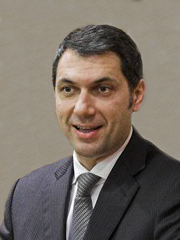
János Lázár is a Hungarian politician and Member of Parliament. He was former leader of the Fidesz parliamentary group (2010–2012) and State Secretary, then Minister of Prime Minister's Office (2012–2018) in the cabinets of Viktor Orbán. In this capacity, he was regarded as de facto the second most powerful member of the cabinet, but lost political influence by 2018. He also served as Mayor of Hódmezővásárhely from 2002 to 2012.
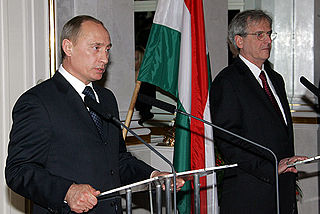
Hungarian president László Sólyom was not allowed to step on Slovak soil on August 21, 2009, as he was about to attend the unveiling of a statue of St. Stephen, the first king of Hungary (1000–1038), in Komárno, Slovakia, a town near the Hungarian border, where ethnic Hungarians form the majority of the population.

László Kövér is a Hungarian politician and the current Speaker of the National Assembly of Hungary. He was the acting President of Hungary from 2 April 2012 to 10 May 2012, after the resignation of Pál Schmitt.

András Schiffer is a Hungarian lawyer and former politician, who served as co-President of the Politics Can Be Different and leader of its parliamentary group. Schiffer announced his retirement from politics on 31 May 2016.

An indirect presidential election was held in Hungary on 29 June 2010. The Prime Minister's nominee Pál Schmitt was elected by an absolute majority.
Lt. Gen. Dr. Tamás Kovács is a Hungarian military officer and jurist, who served as Chief Prosecutor of Hungary from 2006 to 2010.

Annamária Szalai was a Hungarian journalist, politician, Member of Parliament (MP) for Zala County, Fidesz (1998–2004). She became a member of the National Radio and Television Commission (ORTT) in 2004, as a result resigned from her parliamentary seat. Szalai served as President of the National Media and Infocommunications Authority (NMHH) from 2010 until her death.
Sólyom Hungarian Airways Ltd. was a Hungarian airline start-up with its head office in Budapest at Budapest Liszt Ferenc International Airport It was founded in 2013 after Malév Hungarian Airlines, the former flag carrier of Hungary, ceased operations in February 2012. It has never started operations.

An indirect presidential election was held in Hungary on 5–6 June 2000. The only candidate was legal scholar Ferenc Mádl, who was nominated formally by the FKGP, a coalition member of the first cabinet of Viktor Orbán, composing Fidesz, FKGP and MDF. The left-wing and the far-right (MIÉP) opposition parties did not nominee a candidate. After three rounds, Mádl was elected President of Hungary, taking the office on 4 August in that year.

An indirect presidential election was held in Hungary on 13 March 2017. János Áder was elected President of Hungary for a second term.



